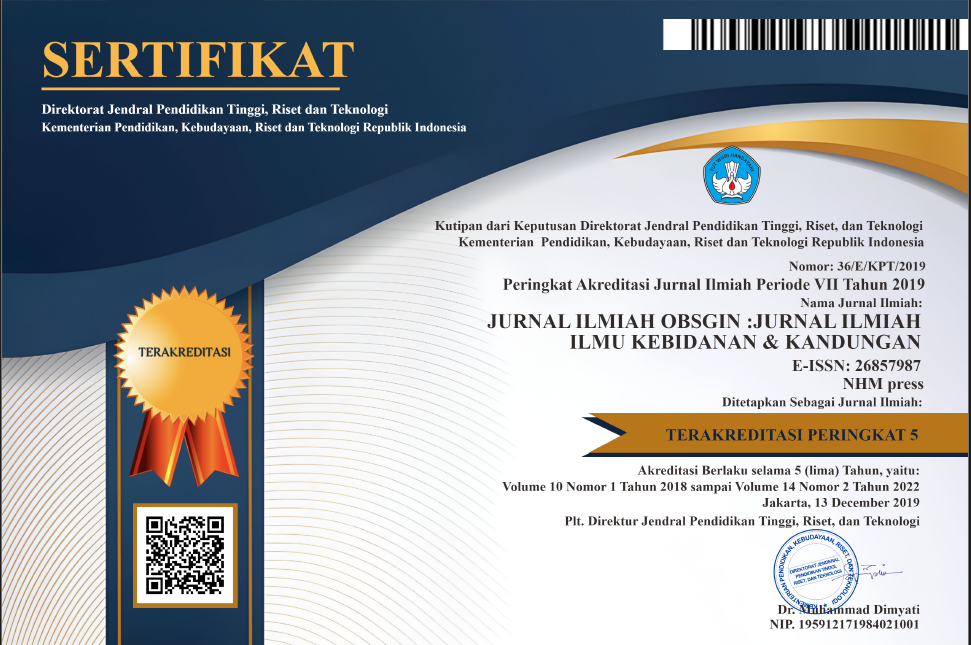Peran Genetik dan Lingkungan dalam Diabetes Gestasional: Systematic Review
Abstract
Gestational diabetes mellitus (GDM) is a condition that arises during pregnancy due to impaired glucose metabolism. Its development is influenced by a complex interaction between genetic and environmental factors. Genetic factors, such as insulin resistance and glucose metabolism, alongside environmental influences including diet, physical activity, air pollution, and stress, play significant roles in increasing GDM risk. This analysis is based on a literature review examining the relationship between genetic factors, environmental factors, and their interaction in GDM risk. The review includes data from studies on lifestyle, environmental exposures, and underlying genetic mechanisms contributing to GDM development. Research indicates that unhealthy lifestyles, such as high-fat diets and physical inactivity, significantly exacerbate GDM risk in individuals with a genetic predisposition. Environmental exposures, such as air pollution and stress, further deteriorate glucose metabolism through epigenetic changes. These interactions demonstrate that both genetic and environmental factors simultaneously contribute to the elevated risk of GDM. A deeper understanding of the interplay between genetic and environmental factors offers valuable insights for the prevention and management of GDM. Personalized strategies emphasizing healthy lifestyles and mitigating environmental exposures could be effective approaches, particularly for individuals with high genetic risk.
References
Barrera, R. S., & Ruiz, A. (2021). Air pollution exposure during pregnancy and the risk of gestational diabetes mellitus: A cohort study in a highly polluted urban area. Environmental Pollution, 273, 115722. https://doi.org/10.1016/j.envpol.2020.115722
Brown, E. M., Smith, R. D., & Jones, A. L. (2023). Dietary patterns and physical activity levels as risk factors for gestational diabetes mellitus: A meta-analysis. Journal of Nutrition, 153(4), 1123-1134. [DOI: 10.1093/jn/nxad097]
Buchanan, T. A., Xiang, A. H., & Peters, R. K. (2021). Dietary Patterns and Risk of Gestational Diabetes Mellitus. Diabetes Care, 44(8), 1804-1812. [DOI: 10.2337/dc21-0171]
Chen, H., Li, M., & Zhang, Y. (2019). Maternal exposure to endocrine-disrupting chemicals and the risk of gestational diabetes mellitus. Environmental Health Perspectives, 127(7), 77003. https://doi.org/10.1289/EHP4320
Duo, J., Yang, L., & Zheng, X. (2020). Genetic Variants in GCKR and Risk of Gestational Diabetes Mellitus: A Meta-Analysis. Diabetologia, 63(4), 667-677. [DOI: 10.1007/s00125-020-05140-7]
Feinberg, M., Smith, J., & Garcia, M. (2022). Mediterranean Diet and Gestational Diabetes Mellitus: A Comprehensive Review. Nutrition Reviews, 80(9), 1194-1205. [DOI: 10.1093/nutrit/nuac053]
Feldman, R., & Eidelman, A. I. (2022). Psychological Stress and Gestational Diabetes Mellitus: The Role of Stress Hormones. Endocrine Connections, 11(4), 435-443. [DOI: 10.1530/EC-22-0098]
Garcia, M., & Mendez, A. (2021). Sleep Quality and Risk of Gestational Diabetes Mellitus: A Longitudinal Study. Journal of Clinical Sleep Medicine, 17(6), 1375-1384. [DOI: 10.5664/jcsm.9306]
Khan, M. A., Baser, I. S., & Williams, R. (2022). Long-term consequences of gestational diabetes mellitus: A review of recent studies. Diabetes Research and Clinical Practice, 188, 109896. [DOI: 10.1016/j.diabres.2022.109896]
Khan, M. A., Baser, I. S., & Williams, R. (2023). Weight Management and Gestational Diabetes: Evidence from Recent Studies. Obesity Reviews, 24(1), e13432. [DOI: 10.1111/obr.13432]
Kwak, J. W., et al. (2022). Interaction between genetic variants and environmental factors in the risk of gestational diabetes mellitus: A case-control study. Diabetes Research and Clinical Practice, 179, 108877. https://doi.org/10.1016/j.diabres.2022.108877
Lee, S. Y., Kim, J. H., & Park, C. (2023). Epigenetic Mechanisms Linking Genetic Predisposition and Environmental Factors in Gestational Diabetes. Molecular Genetics and Metabolism, 140(1), 55-64. [DOI: 10.1016/j.ymgme.2023.01.002]
Liu, Y., et al. (2020). Genetic-environmental interactions in gestational diabetes mellitus: The role of lifestyle factors and epigenetics. BMC Pregnancy and Childbirth, 20, 35. https://doi.org/10.1186/s12884-020-2774-7
Liu, Y., Zhang, Y., & Zhou, X. (2020). The effect of noise pollution on gestational diabetes mellitus: A cross-sectional study in urban areas. Science of the Total Environment, 741, 140405. https://doi.org/10.1016/j.scitotenv.2020.140405
Moyers, S. A., & Al-Bashir, A. (2021). The Impact of Physical Activity on Gestational Diabetes Mellitus: Evidence and Recommendations. American Journal of Lifestyle Medicine, 15(4), 347-357. [DOI: 10.1177/15598276211021804]
Smith, L. A., Johnson, M. K., & White, C. M. (2022). Obesity and Gestational Diabetes Mellitus: A Review of the Evidence and Clinical Implications. Obesity Reviews, 23(8), e13485. [DOI: 10.1111/obr.13485]
Tian, H., Liu, X., & Zhang, Q. (2021). Association of TCF7L2 Variants with Gestational Diabetes Mellitus in Different Ethnic Populations: A Systematic Review and Meta-Analysis. Journal of Clinical Endocrinology & Metabolism, 106(8), e3054-e3066. [DOI: 10.1210/clinem/dgab331]
Ting, W., Wang, Q., & Li, X. (2020). Impact of dietary patterns and environmental exposures on the risk of gestational diabetes mellitus in China. BMC Public Health, 20, 1159. https://doi.org/10.1186/s12889-020-09342-1
Yang, X., Xu, D., & Wu, Y. (2018). Ambient temperature variations and the risk of gestational diabetes mellitus in a cohort of pregnant women. Diabetes Care, 41(10), 2127-2134. https://doi.org/10.2337/dc18-0584
Yang, Z., Li, Y., & Yu, X. (2022). Community-Based Interventions for Gestational Diabetes Mellitus: A Systematic Review. American Journal of Preventive Medicine, 63(1), 101-114. [DOI: 10.1016/j.amepre.2022.02.005]
Zhan, Y., Li, C., Chen, J., Yu, S., Gao, Q., Wang, Y. P., et al. (2015). Association between Macrophage Migration Inhibitory Factor Rs1007888 and GDM. Genetics and Molecular Research, 14(1), 797–804. DOI: 10.4238/2015.February.2.4
Zhang, B., Jin, Z., Sun, L., Zheng, Y., Jiang, J., Feng, C., et al. (2016). Expression and Correlation of Sex Hormone-Binding Globulin and Insulin Signal Transduction and Glucose Transporter Proteins in Gestational Diabetes Mellitus Placental Tissue. Diabetes Research and Clinical Practice, 119, 106–117. DOI: 10.1016/j.diabres.2016.07.003
Zhang, M., Zhang, Y., Ma, J., Guo, F., Cao, Q., Zhang, Y., et al. (2015). The Demethylase Activity of FTO (Fat Mass and Obesity-Associated Protein) Is Required for Preadipocyte Differentiation. PLOS ONE, 10(7), e0133788. DOI: 10.1371/journal.pone.0133788
Zhang, X., Shi, C., Wei, L., Sun, F., Ji, L. (2019). The Association between the Rs2975760 and Rs3792267 Single Nucleotide Polymorphisms of Calpain 10 (CAPN10) and Gestational Diabetes Mellitus. Medical Science Monitor, 25, 5137. DOI: 10.12659/MSM.914930
Zhang, Y., et al. (2021). Genetic and environmental contributions to the development of gestational diabetes mellitus in a multi-center cohort. Endocrine Connections, 10(7), 717-725. https://doi.org/10.1530/EC-21-0175
Zhao, P., Liu, E., Qiao, Y., Katzmarzyk, P. T., Chaput, J. P., Fogelholm, M., et al. (2016). Maternal Gestational Diabetes and Childhood Obesity at Age 9–11: Results of a Multinational Study. Diabetologia, 59(11), 2339–2348. DOI: 10.1007/s00125-016-4062-9
Zhu, Y., & Li, Y. (2017). The impact of maternal psychological stress and environmental factors on gestational diabetes mellitus in a Chinese population. Journal of Diabetes Investigation, 8(4), 469-475. https://doi.org/10.1111/jdi.12627
Zhu, Y., Li, M., & Zhang, X. (2023). Genetic variants associated with gestational diabetes mellitus: Insights from genome-wide association studies. Diabetologia, 66(2), 213-226. [DOI: 10.1007/s00125-022-05748-5]











